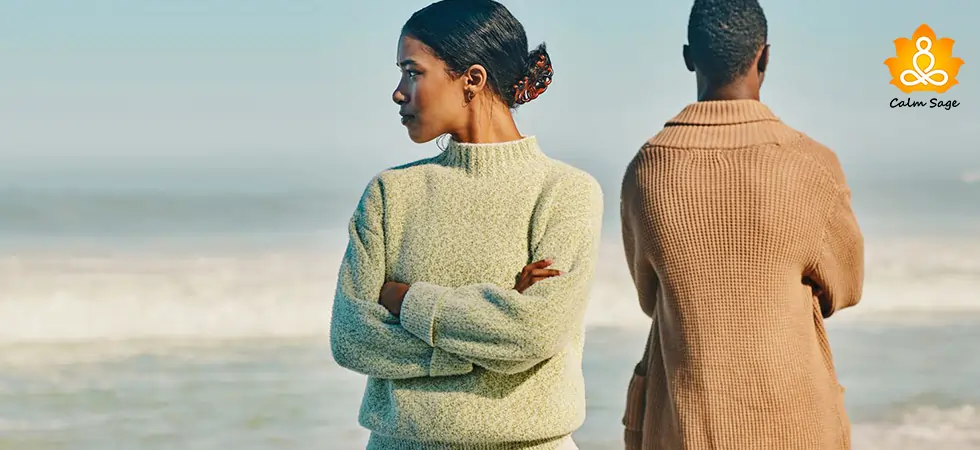8 Lessons to Learn From Past Relationships (And How to Make Them Stick)

Relationships are hard work; you need to put time, patience, and respect into getting to know someone. You and I, we’re all humans, and as such liable to make mistakes. I remember the mistakes I made when I was growing up, becoming an adult from a teen. I made mistakes in making friends, and I made mistakes in making wrong decisions (at that time). But, the best part is that I learned. There were always hidden lessons to learn from the past, and I did.
It’s a part of life, after all; making mistakes and yet learning from them. These mistakes are not limited to life decisions but can be extended to relationships too.
Maybe the friend you had in college was good to you then, but after graduation, you realized that this friendship was one-sided. Maybe the partner you had in your 20s was fun then, but later you realized their immaturity was holding you back.
We all have something to learn from past relationships and experiences. I might not have all the wisdom of the world at my fingertips, but I do have a voice that I’ll use to help you see and learn lessons from past experiences that you might’ve overlooked.
I hope the lesson I share in this post will help you become aware and encourage you to make the right choice in the future.
Lessons to Learn From Past Relationships
When I say relationships, I mean to talk about platonic as well as romantic relationships. Any failed relationship can and will teach you a thing or two about yourself and how you handle a relationship. Here are 8 powerful lessons you can learn from past relationships;
1. You Can’t Change Others, Only Yourself
One thing you can learn from past relationships is that you have the power to control and change yourself. No one else can do that for you, and you can’t do it for others. If you keep changing or controlling your partner and their actions, it’ll lead to frustration and anger, which will turn to disappointment.
You might think “good intentions” but it won’t work unless you or your partner truly want to change. So, know that you can’t control or change others, nor can anyone else with you — only you can.
2. You Need to be Independent
In a relationship or a friendship, it can be easy to focus on the other person’s needs rather than your own. When you do that, you might even do it at the expense of your happiness and growth. A lesson you can learn here is that there is beauty in taking care of yourself and pursuing what you like, independently.
“When you live for others, conflicts arise. But, when you live for and focus on yourself, things change.”
3. Attachment Styles are Common
From your past relationships, you learn how to act and be with someone else. This can make you feel aware of unhealthy attachment styles and your own. We develop attachment styles as an infant, but they might continue to haunt us and dictate our behavior in adult relationships as well. Knowing attachment issues can be the first step in changing how you view your relationships. If you know what’s the problem, you can work on changing your thinking.
Know that it’s not about blaming others or yourself. It’s about knowing why you act the way you do and how you can move forward from there.
“Before you blame others (or yourself) for what’s wrong, try to do some self-reflection. The more you understand your triggers, fears, and belief system, the easier it will be for you to work on yourself.”
4. Compromise is a Two-Way Street
I have listened to (and experienced) how only one person in a relationship compromises, and the other almost always expects them to, but never does it themselves. We learn this lesson after failed relationships. Compromise is an important part of any relationship – be it friendships or romantic relationships. With your ex, you might have either compromised too much, or too little.
Do some self-reflection and see how this little thing called compromise is a two-way street. Say, you and your ex were in a long-distance relationship. But, it was only you who traveled back and forth. This is an example that only one of you was compromising.
5. You Need to be True to Yourself
Your last relationship might have been a failed relationship, but it also might have taught you how to be true to yourself. In your past relationship, you saw things differently and behaved differently, and your interests aligned more with your ex rather than your values. But was it worth it?
Moving on from a past relationship teaches you that changing yourself for others is not a good way to live. You need to be true to yourself so that you can become more confident in yourself and exist as you’re meant to. It’s about affirming and loving yourself more, every day.
6. Honest Communication is Key
Another thing to learn from past relationships is that honest and open communication can change things. Look back on your failed relationships. See how many arguments and discussions ended with misunderstandings and conflict. Now, reframe those situations and think that if you’d communicated, how things might have turned out. We don’t always realize this, but being open and honest with your loved ones can be transforming for your relationships.
7. Your Partner Isn’t Everything
When you’re in that “honeymoon” phase of a new relationship, you feel as if the world revolves around your partner. For a while, you bask in that new love and forget other connections exist. Learn a lesson from past experiences, my friend. Other relationships – friends and family – matter. You need to know how to balance your relationships and friendships. Your world don’t revolve around a person. There has to be some sense of self-identity.
8. Always Listen to Your Instincts
Look back on your failed relationships and think about all the red flags you missed, even after your instincts told you not to miss them. This is another lesson to learn from past relationships, so note it down. Disrespect, dishonesty, and no communication – are all red flags. If your instincts say it’s bad, then listen to them.
There could be moments in your future relationship where you instinctively feel something amiss. Don’t ignore it. See how things play out, but if you feel a warning sign blaring, STOP and walk away.
How to Make These Lessons Stick?
Now that I’ve imparted some worthwhile lessons to learn from past relationships, let’s take a look at how you can make these lessons stick so that mistakes are not repeated in your future ones;
-
Do some self-reflection
Take some time and reflect on what went wrong and what could have been done differently. Journal or talk to a friend or therapist about your reflections. It’s good to look back and learn, but don’t go too deep. Stay in the present moment and look back as logically (not emotionally) as you can.
-
Set boundaries
Peace of mind – whether you’re on your own or in a relationship – is important, so set boundaries. If it’s your ex (friend or partner), try to limit contact with them, or you can choose not to talk about certain things with them if they contact you. It’s about protecting your peace, so understand your boundaries and implement them.
-
Find out who you are
Relationships are like that; once you connect with someone, you become enmeshed too. Their interests become yours, their passions become yours, and their life becomes synonymous with yours. Try to separate yourself from that and find out who you are. Rediscover your hobbies, interests, and passions.
-
Ask for support
To ensure that the lessons you learned stick, ask for help. Lean on your trusted person or people sooner rather than later. Being surrounded by friends and family on whom you can lean on is important for healing. These people can help you apply the lessons you’ve learned in your future relationships, too.
-
Let these lessons be reminders
Your lessons are reminders, so use them wisely. If you’ve learned something from your failed relationships, then accept them, heal, and see how you can move forward. The lessons I’ve listed are the ways you can change your behavior and learn to see the negatives. So, let them be reminders to develop a healthy mindset in the future.
-
Accept the healing process
Now that you know the lessons learned, accept the healing – no matter how slow it can be. There would be regret, denial, and frustration too. You might think “I wish I’d done that differently” or “I wish I didn’t act that way”. It’s OK. Accept what happened and your role in it, but allow yourself to heal.
Wrapping Up…
Accepting the past mistakes and your role in them can be hard. But, with the help of your loved ones, self-awareness, and self-understanding, you can learn to move on and change how you view and act in a relationship. If you’re finding it difficult to move on and accept the lessons learned, then reach out to a therapist for help. They can help you understand your attachment style, improve two-way communication, and prepare you for future relationships.
Failed relationships aren’t the end of the world or the end of your confidence. They can be painful indeed, but they don’t have to stay that way. With time, space, and a little support from loved ones, you can learn a lot about love, respect, and more importantly yourself.
I hope this article helped you understand things to learn from past relationships and how to make them stick. Let me know what you have learned from past relationships in the comments below. We’ll try to add your lessons to our article!
Take care!




















